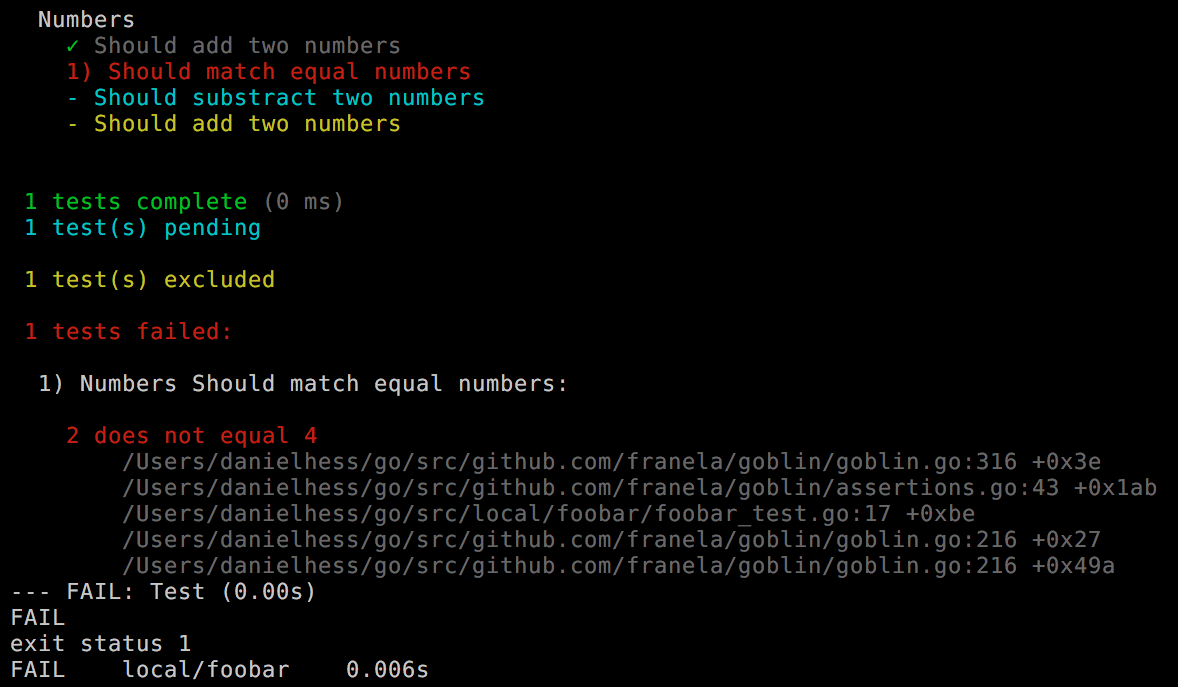| .. | ||
| assertions.go | ||
| go.snippets | ||
| goblin_logo.jpg | ||
| goblin_output.png | ||
| goblin.go | ||
| LICENSE | ||
| Makefile | ||
| mono_reporter.go | ||
| README.md | ||
| reporting.go | ||
| resolver.go | ||
 Goblin
Goblin
A Mocha like BDD testing framework for Go
No extensive documentation nor complicated steps to get it running
Run tests as usual with go test
Colorful reports and beautiful syntax
Why Goblin?
Inspired by the flexibility and simplicity of Node BDD and frustrated by the rigorousness of Go way of testing, we wanted to bring a new tool to write self-describing and comprehensive code.
What do I get with it?
- Preserve the exact same syntax and behaviour as Node's Mocha
- Nest as many
DescribeandItblocks as you want - Use
Before,BeforeEach,AfterandAfterEachfor setup and teardown your tests - No need to remember confusing parameters in
DescribeandItblocks - Use a declarative and expressive language to write your tests
- Plug different assertion libraries (Gomega supported so far)
- Skip your tests the same way as you would do in Mocha
- Automatic terminal support for colored outputs
- Two line setup is all you need to get up running
How do I use it?
Since go test is not currently extensive, you will have to hook Goblin to it. You do that by
adding a single test method in your test file. All your goblin tests will be implemented inside this function.
package foobar
import (
"testing"
. "github.com/franela/goblin"
)
func Test(t *testing.T) {
g := Goblin(t)
g.Describe("Numbers", func() {
g.It("Should add two numbers ", func() {
g.Assert(1+1).Equal(2)
})
g.It("Should match equal numbers", func() {
g.Assert(2).Equal(4)
})
g.It("Should substract two numbers")
})
}
Ouput will be something like:
Nice and easy, right?
Can I do asynchronous tests?
Yes! Goblin will help you to test asynchronous things, like goroutines, etc. You just need to add a done parameter to the handler function of your It. This handler function should be called when your test passes.
...
g.Describe("Numbers", func() {
g.It("Should add two numbers asynchronously", func(done Done) {
go func() {
g.Assert(1+1).Equal(2)
done()
}()
})
})
...
Goblin will wait for the done call, a Fail call or any false assertion.
How do I use it with Gomega?
Gomega is a nice assertion framework. But it doesn't provide a nice way to hook it to testing frameworks. It should just panic instead of requiring a fail function. There is an issue about that here. While this is being discussed and hopefully fixed, the way to use Gomega with Goblin is:
package foobar
import (
"testing"
. "github.com/franela/goblin"
. "github.com/onsi/gomega"
)
func Test(t *testing.T) {
g := Goblin(t)
//special hook for gomega
RegisterFailHandler(func(m string, _ ...int) { g.Fail(m) })
g.Describe("lala", func() {
g.It("lslslslsls", func() {
Expect(1).To(Equal(10))
})
})
}
FAQ:
How do I run specific tests?
If -goblin.run=$REGES is supplied to the go test command then only tests that match the supplied regex will run
TODO:
We do have a couple of issues pending we'll be addressing soon. But feel free to contribute and send us PRs (with tests please 😄).
Contributions:
Special thanks to Leandro Reox (Leitan) for the goblin logo.

